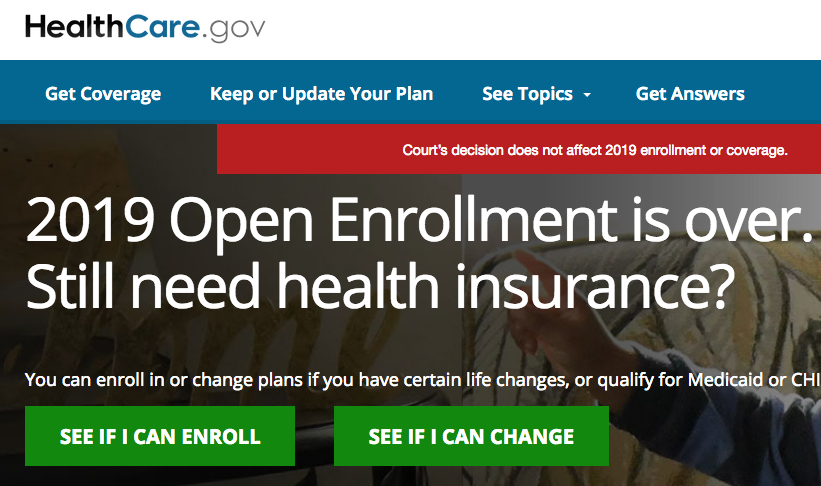
Susan Weinstein, J.D.
Editor in Chief, Care for Your Mind
In a decision more political than legally sound, a judge in a U.S. District Court in Texas struck down the Affordable Care Act (ACA, also known as Obamacare) last week. (Download the 55-page decision.) In Texas v. U.S.A., Judge Reed O’Connor determined that when Congress removed the penalty for not having health insurance, it rendered the entire ACA statutory scheme invalid. However, knowing that the decision would be appealed, the judge left the ACA to function normally until it ran its course in the court system. Attorneys from along the political spectrum are dubious at best about the judge’s reasoning and conclusion.
The U.S. Department of Health and Human Services “health.gov” website includes a home page banner notice that the ACA continues in force. Apart from the court decision, the ACA has also had to withstand the Trump Administration’s attempts to weaken it. Their tactics have included slashing (eviscerating would be more accurate, as the cuts are 80-90% of the budget) funding for open enrollment advertising and enrollment assistance. The Administration has also indicated approval of non-ACA-compliant health insurance plans.
Although the President may remain in office for the next two years and the Republicans hold a strong majority in the Senate, the influx of Democratic Members of Congress and the transition to Democratic control should provide for plenty of Congressional attention to health care. Democratic legislators generally support the ACA and its foundational requirements: health insurance for everyone, no exclusions for pre-existing conditions, mental and behavioral health being included in health insurance plans, and insurance premiums decided without regard to a person’s health status.
While political observers already expected health care to be a hot topic in the new Congressional session, Judge O’Connor has added fuel to that fire.
The start of the year may be a good time to contact your legislators and tell them how the Affordable Care Act has helped your family. Here are some issues that might be relevant to you.
The Affordable Care Act is important to you because
- you or a family member has a pre-existing mental health or other health condition
- the cost of health insurance premiums is too high without a federal subsidy
- the private insurance market is too difficult to navigate so you use the enrollment portals
- you have a child on your insurance who is between the ages of 22 and 26, and you would not otherwise be able to include them on your policy
- you or your family are eligible for health insurance through the Medicaid expansion, whereas you would not otherwise be able to afford insurance
- it had been difficult to get coverage for mental health care before the ACA’s Essential Health Benefits
- your children receive better preventive care than they would have under your prior insurance.
There are many reasons to appreciate the Affordable Care Act and how it changed the availability and affordability of health care. The ACA introduced a number of features now seen as integral to our health care, such as free preventive care, birth control, mammograms, and cholesterol testing; requirement of covering mental health services; and the presumption that everyone will have health insurance. In 2019, we will need to raise our voices to protect our mental health care.
P.S. Remember that Senators and Members of Congress have district offices in your state and you may be able to get noticed more through that office than the DC office. This page provides contact information for many areas of government.
Check out our downloadable Selected Readings on Healthcare Reform.
Editor’s Note: This is our final post of 2018. From all of us at Care for Your Mind and Families for Depression Awareness, we wish you the best through the holidays and in the coming year.
What do you think?
- What about the Affordable Care Act is important to you and your family?
- What will you do to advocate for health insurance and mental health care?
Tell us on Facebook!









Connect With Us